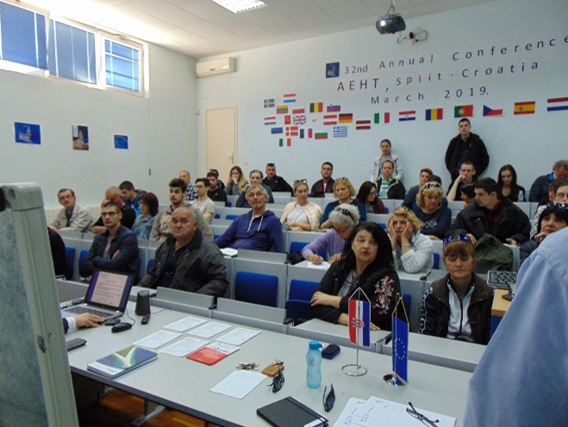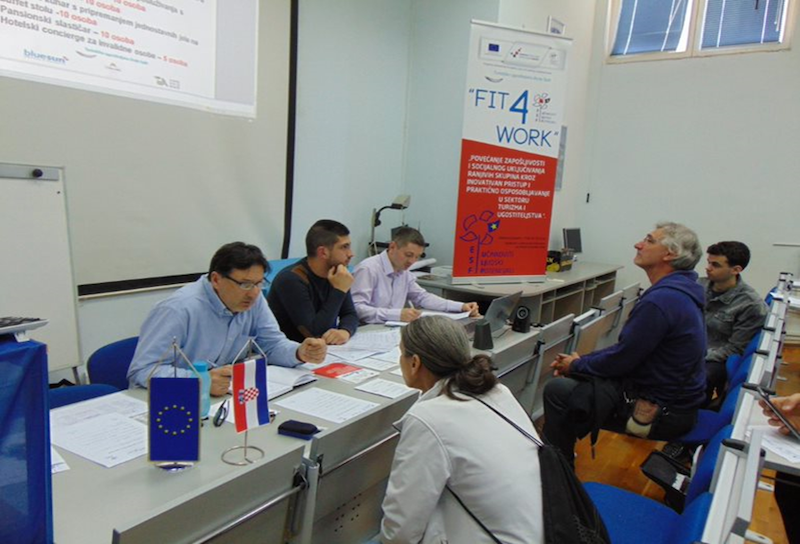December 20, 2019 – About 10% of tourists have some disability, though their specific needs are not adequately recognized in the hotel industry. Thus, Fit4Work organized a concierge training for disabled tourists in Split, which was the first of its kind in Croatia.
The Tourism and Hospitality School of Split has implemented another major project this year. Namely, the Fit4Work project has been designed by the school and is aimed at training the long-term unemployed people over 54 years of age, people with disabilities, and young people who were not previously connected with the hospitality and tourism industry.
The implemented programs related to the professions of an assistant chef, guest waiter, guest confectioner, bartender/barista, and one particular specialization – hotel concierge for disabled people. The latter was also the most demanding as it lasted 280 hours. The Fit4Work project involved 45 unemployed people, with the implementation lasting 20 months. In order to ensure its quality, 12 teachers from the Split Tourism and Hospitality School, two mentors from “Bluesun – Hotel Company Tucepi”, two mentors from the Hotel “Cornaro” and a representative of the association for inclusion “Lastavica” participated in the project.

The hotel concierge for disabled people was held in Croatia for the first time:
“About 10% of travelers and tourists in the world are persons with some kind of disability, but their specific needs are not adequately recognized in the hotel industry,” explained the project manager Slaven Skrabic, a professor at the Split School.
“Five people were educated through this program, which we conducted in collaboration with the Cornaro Hotel in Split. Tourism professionals need to think about the needs of people with disabilities. For example, when a guest at a hotel requests a personalized tour of the Diocletian’s Palace, the hotel concierge in that situation contacts an outside agency, a guide greets the guest at an agreed location, and the tour begins – but what about when a person in a wheelchair arrives? In this case, the concierge can not only leave the guest to the guide, but will first meet with the guide and together determine the route of the tour, ensuring that an adequate vehicle arrives for the guest, that they go to locations that are not too crowded, and there are no architectural barriers in the way,” explained Professor Skrabic.
During the study trip to London, the mentors had the opportunity to see how the system works there. In England, in particular, awareness of the importance of employing people with disabilities is higher, entrepreneurs do not have benefits, but they see the employment of people with disabilities as an investment in society. Thus, it is necessary to invest in raising the awareness of the importance of employing vulnerable groups for it to grow in our society over the years.
“It is necessary for at least one member of the hotel staff to be educated on this topic. Concierge training for people with disabilities provides very concrete knowledge with many practical examples and we continue to implement it in our school,” concluded project manager Slaven Skrabic.

The practical part of the four-way education, i.e., the bartender/barista and the assistant waiter, chef and confectioner, were done by the project participants at the Bluesun Hotel Alga in Tucepi:
“Our impressions are excellent. We were pleased to participate in including vulnerable groups in the labor market. We presented the students with the hotel part of the service and the necessary professional skills to gain direct experience of working in a real, day-to-day business. Participation in such projects is not only important to companies in the context of CSR, but is a general advantage for the entire Croatian economy,” explained Filip Benjak, Career Development Manager at Bluesun Hotels.
The Fit4Work project ultimately resulted in employment in this sector for more than half of the 45 trainees within a few months. Much emphasis has been placed on digital and distance learning, which is why e-learning platforms have been designed and built to help participants stay in touch with mentors and work on their training after the end of the project.
The value of the Fit4Work project is €1,948,063.00 and is fully funded by the European Union through the European Social Fund.
To read more about travel in Croatia, follow TCN’s dedicated page.







